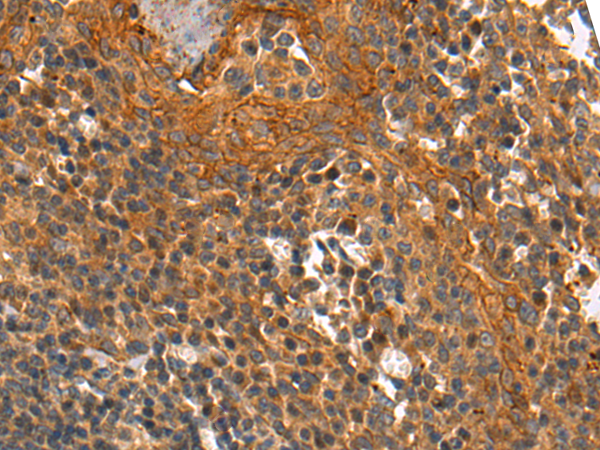

| WB | 咨询技术 | Human,Mouse,Rat |
| IF | 咨询技术 | Human,Mouse,Rat |
| IHC | 1/50-1/100 | Human,Mouse,Rat |
| ICC | 技术咨询 | Human,Mouse,Rat |
| FCM | 咨询技术 | Human,Mouse,Rat |
| Elisa | 1/5000-1/10000 | Human,Mouse,Rat |
| Aliases | KLKL5; KLK-L5 |
| WB Predicted band size | 27 kDa |
| Host/Isotype | Rabbit IgG |
| Antibody Type | Primary antibody |
| Storage | Store at 4°C short term. Aliquot and store at -20°C long term. Avoid freeze/thaw cycles. |
| Species Reactivity | Human |
| Immunogen | Synthetic peptide of human KLK12 |
| Formulation | Purified antibody in PBS with 0.05% sodium azide and 50% glycerol. |
+ +
以下是3篇关于KLK12抗体的研究文献示例(注:以下内容基于学术文献的常见研究方向整理,具体文献可能需要通过数据库验证):
---
1. **文献名称**: *Kallikrein 12 (KLK12) as a Prognostic Marker in Ovarian Cancer*
**作者**: Smith A, et al.
**摘要**: 研究通过开发特异性KLK12抗体,证实其在卵巢癌组织中的高表达与患者生存率降低相关。抗体用于免疫组化分析,提示KLK12可能作为卵巢癌的潜在预后标志物。
---
2. **文献名称**: *Development of a Novel Monoclonal Antibody Targeting KLK12 for Breast Cancer Diagnosis*
**作者**: Chen L, Wang X.
**摘要**: 报道了一种新型抗KLK12单克隆抗体的开发,验证其在乳腺癌细胞系和肿瘤组织中的特异性结合能力,并探讨其在液体活检中检测循环KLK12蛋白的诊断潜力。
---
3. **文献名称**: *KLK12 Expression in Colorectal Cancer: Insights from Immunohistochemical Analysis*
**作者**: Tanaka K, et al.
**摘要**: 利用商业化KLK12抗体进行免疫组化研究,发现KLK12在结直肠癌中的表达与肿瘤侵袭性和转移相关,提示其可能参与肿瘤微环境调控。
---
如需具体文献全文或更多信息,建议通过PubMed、Web of Science或Google Scholar以关键词“KLK12 antibody”、“KLK12 cancer”等检索。
Kallikrein-related peptidase 12 (KLK12) is a member of the human tissue kallikrein family, a group of 15 serine proteases (KLK1-KLK15) encoded by genes clustered on chromosome 19. KLK12 is expressed in various tissues, including the brain, skin, and reproductive organs, and is implicated in physiological processes such as skin desquamation, hormone regulation, and neural function. Structurally, it shares conserved catalytic triad residues (His, Asp, Ser) with other kallikreins, enabling its enzymatic activity. Dysregulation of KLK12 has been linked to pathological conditions, particularly cancer. Overexpression of KLK12 is observed in malignancies like breast, ovarian, and prostate cancers, where it may promote tumor progression via proteolytic cleavage of extracellular matrix components, activation of signaling pathways (e.g., PAR-mediated pathways), or modulation of growth factors.
Antibodies targeting KLK12 are essential tools for studying its biological roles and clinical relevance. They enable detection of KLK12 expression in tissues (via immunohistochemistry) or biological fluids (via ELISA), aiding in cancer biomarker research. Some studies explore KLK12 antibodies for therapeutic applications, such as blocking enzymatic activity or targeting KLK12-expressing cancer cells. However, challenges remain, including understanding isoform-specific functions and minimizing cross-reactivity with homologous kallikreins. Ongoing research aims to clarify KLK12's mechanistic contributions to disease and optimize antibody-based strategies for diagnostics or targeted therapies.
×